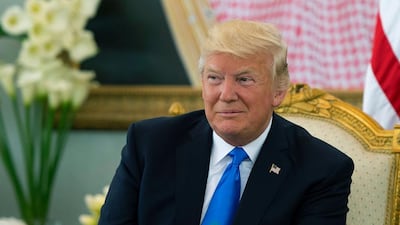The developing and serious crisis of legitimacy confronting the presidency of Donald Trump could have significant implications for American Middle East policy. But Washington's allies need a clear understanding of what is, and is not, at stake.
Mr Trump created a political catastrophe through shocking comments following the deadly white supremacist mêlée in Charlottesville, Virginia, that equated neo-Nazis with Americans opposing racism.
He's now being treated as a pariah, including by natural allies like major corporate leaders, and a wide range of mainstream political and social figures, including key Republicans. Many former supporters have clearly given up on him.
Many are stepping forward to try to fill the void of national leadership without the authority of the presidency but sensing that Mr Trump is unwilling or unable to play that role.
He appears to have completely lost the respect of much of the Republican senate majority, without which his ability to govern will be effectively crippled.
Mr Trump now looks like a lame duck president after only eight months in office.
This crisis of legitimacy could have profound repercussions for the global US role.
One of the brighter spots of Mr Trump's presidency thus far is the renewed commitment to engage with the Middle East in general, and traditional US regional allies, including Gulf Arab countries, in particular.
Among the important initiatives Mr Trump and his administration have been pursuing are Israeli-Palestinian peace, resolving the standoff between the Arab quartet and Qatar, coordinating the battle against ISIL, stepping up the US role in Yemen, searching for a more effective approach in Afghanistan and seeking to contain and roll back Iran.
Some of these important initiatives may be significantly undermined by Mr Trump's dysfunctional administration.
Internally, the White House is in chaos. Mr Trump is haemorrhaging senior staff, most recently dismissing his chief strategist, Steve Bannon. This is in addition to a chief of staff, national security adviser, press secretary, two communications directors, and several other senior officials, who have all come and gone in mere months.
Hopefully this upheaval, including Mr Bannon's removal, will prove necessary housecleaning by retired Gen John Kelly, Mr Trump's new chief of staff. Mr Kelly has vowed to end factional infighting and impose discipline on the administration's functioning. Mr Bannon took pleasure in backbiting, most recently his vicious campaign to unseat national security adviser HR McMaster by casting him as anti-Israeli.
However, under the overall circumstances, and given Mr Trump's statements regarding the Charlottesville rally, it's hard to imagine that even if Mr Kelly can control White House staff, there is much he can do to manage Mr Trump, who has decisively emerged as his administration's own worst enemy.
MORE FROM HUSSEIN IBISH Trump administration may have no choice but to pick its poison
Nonetheless, removing Mr Bannon should help lift the lingering aroma of Islamophobia from the Trump election campaign, given that Mr Bannon's website, Breitbart.com, is a leading forum for anti-Muslim bigotry. Hopefully remaining Breitbart fanatics will also be shortly discharged.
Such overdue changes should help to clear the air between this administration and many Muslims.
Moreover, Mr Bannon's version of nationalism, which he casts as "economic nationalism" but more closely resembles "white nationalism", has a dangerously neo-isolationist bent. He strongly opposed many crucial American international commitments, and was agitating against deeper engagements in Afghanistan, Syria and elsewhere.
Therefore, if Mr Trump's version of an "America first" foreign policy is to, in practice, avoid becoming a further retreat by Washington from the international and Middle Eastern scenes, Mr Bannon's removal can only be a good thing.
However, it will now be very difficult for Mr Trump to lead the kind of bold and energetic new initiatives that could significantly repair some of the drift and misdirection that has crept into American Middle East policy since the second term of Barack Obama.
More proactive, dynamic and intelligently assertive American approaches to resolving the conflict in Syria, rolling back Iran's growing regional dominance, defeating terrorist groups like ISIL and Al Qaeda and effectively combating their ideology, and taking advantage of an important an unexpected historical opportunity to simultaneously advance Israeli-Palestinian peace and create a new strategic framework in the Middle East would all require and effective foreign policy team working under the guidance and political leadership of a strong and relatively popular president.
MORE FROM OPINION The revenge of history, the return of strongmen and the retreat of liberalism
They would necessarily involve difficult choices that would have to overcome significant opposition. This can't be done by an administration in chaos, and certainly not by a president enduring a virtually unprecedented crisis of confidence and legitimacy.
Yet there is no reason to despair. Most American policies in the Middle East, such as core support for traditional allies, reflect a Washington consensus. Military-to-military relations, arms sales and technology transfers, intelligence and cybersecurity cooperation, trade and so forth will continue with Washington's partners regardless of the crisis besetting the Trump administration.
So, the good news for America's Arab allies is that, despite this genuinely significant political crisis, everything will go on more or less as usual. And the bad news is that, because of it, everything will go on more or less as usual.
Hussein Ibish is a senior resident scholar at the Arab Gulf States Institute in Washington


